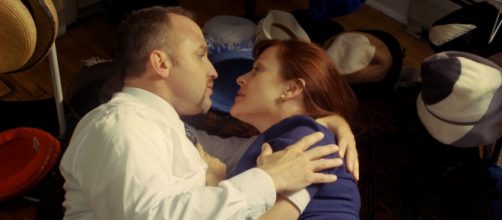Lisa Mikatarian is the Director of a new feature film titled “Spent.” This film is her directional ode to the style of the Cohen brothers, and its story focuses on the unlikely--and darkly funny--scenario where a family is celebrating the impending death of its miserable and difficult patriarch…only to be confronted with the realization that the horrible old man has made a miraculous recovery!
Lisa recently discussed “Spent” and her experiences making entertaining movies in a recent and exclusive interview.
Directing movies and 'Spent' inspiration
Meagan Meehan (MM): What inspired you to become a filmmaker and how did you find your “big break” into the competitive directing industry?
Lisa Mikatarian (LM): I’m a writer/storyteller by trade, but it wasn’t until my publisher asked me to take one of my short stories and make it a film short to help promote the collection that was ready for release that I realized three things: Firstly, film was the media that gave my artistic bent (both visual and audio) flight. Secondly, at some point, while I was busy writing, filmmaking had become accessible to regular people—and that included me. Thirdly, all those hours I had “lost” devouring films over the years, were really preparatory in nature.
Score!
I’m not sure I can classify the making of this movie as a big break—feel like I have a long way to go. I can say without a doubt that when David Doko, a gifted cinematography from LA, came on board that it completely changed the scope of the production. It didn’t matter that I was a first-time producer or director, I had a responsibility to become as proficient as I could as quickly as I could to make this film happen in the best way possible. I was also incredibly fortunate for the caliber of the crew who came to the project. Austin Behan was our lighting guru. Lentrell McEachern, our sound engineer guru. Of course, great acting is at the heart of a film—and we had actors who took on their crazy characters and never looked back.
James F. Cotton wrote an incredibly entertaining score for the film, and how can I not mention our editors Jeff Herberger and Erik Kristopher Meyers? I can honestly say that we are all filmmakers—each of us had a part in the whole.
MM: How did you get involved in “Spent”?
LM: After I made that initial short film, I wanted to learn how to write a feature script. A screenwriter friend offered to show me the mechanics and gave me an assignment: write a story about a miser whose family spends his money while he’s lying in a hospital dying of a brain tumor—then he has a miraculous recovery. So I did.
MM: Can you tell us about the story and plot of “Spent”– is it a personal one?
LM: It’s not personal in that it was a story forever inside me that needed to come out.
If I had known the script would end up becoming a “real” film, I would have written something meatier! But it is personal in that no writer can leave herself out of the words she sets on paper. Something of the writer shows up. For example, I’ve never had an affair—and I didn’t realize as I was writing it—but if I ever had one, it would be as embarrassingly awkward as Evelyn’s! The whole movie has a charming, vintage unpretentious tone. The comedy is dry, quirky, with characters completely unaware of the absurdity of their lives.
MM: Can you talk about any inspirations for the movie?
LM: Start with old movies—not screwball comedies as much as films like “Arsenic and Old Lace.” Add to that the artistry of Akira Kurosawa and his concept of “every frame a painting,” and finish it off with the subtle yet flamboyant humor of David Lynch.
My inspiration in a bottle.
MM: How much does it mean to you that "Spent" is getting a theatrical release?
LM: It’s both exciting and scary as heck. There’s an illusion to a film, and then there’s the reality. It’s when it becomes a reality that a filmmaker is at their most vulnerable. Especially if it’s your first humble offering.
Current projects, future, and advice
MM: Can you tell us what else you’ve been up to in recent times and where do you hope to go within ten years?
LM: I’m working on a story that was originally going to be a feature but is much better suited to a limited mini-series. I am writing the pilot for that project now. A brother and sister, separated early in life, meet up when they inherit a defunct jean factory.
Two strangers with nothing in common except for a dead mother. A secret room in the factory will be the key to the entire town (some working for, some against) helping the siblings unravel their mother’s murder. So, that's what I'm doing currently. As for the future, ten years from now, I hope to be the caliber of filmmaker that will allow me to take the story that has been on my heart for years, and make it into a film for the ages.
MM: What advice would you give to someone who is aspiring to enter the film industry, especially in the role of a director?
LM: I would give the same advice as I give myself when I feel overwhelmed with the heartbreak that can be the world—do the best you can with what you have where you are. It’s easy to be overwhelmed with all that filmmaking entails. It’s easy to feel inadequate. Start where you can and do your best.


